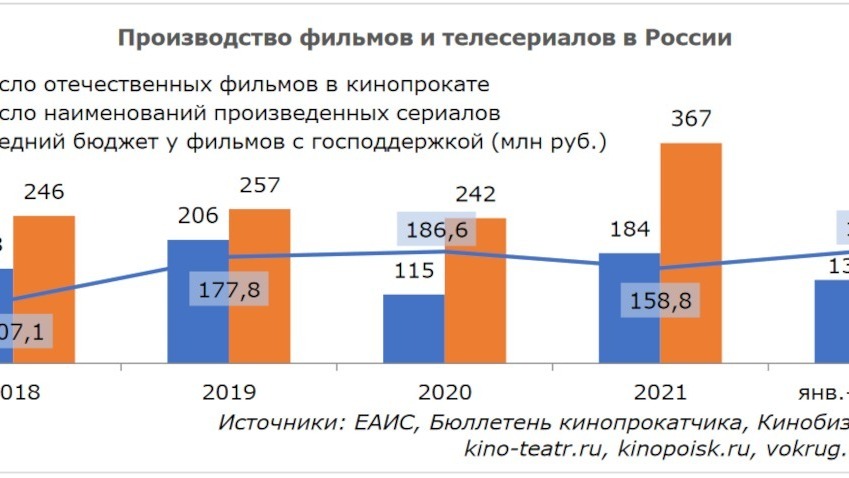Posted 7 августа 2023, 07:18
Published 7 августа 2023, 07:18
Modified 7 августа 2023, 15:34
Updated 7 августа 2023, 15:34

Back to the video salons. What happened to Russian cinema during the year of sanctions
Alexander Dybin
Cinema is getting out of habit
The crisis continues in the Russian film industry, which began with the departure of five major Hollywood studios in early 2022. They made 70% of the box office to all cinemas in the country. Without blockbusters, it becomes more and more difficult to lure viewers to the cinema.
«There is a Russian cinema, but it is not enough, and there is even less quality and box office, » says the head of one of the cinema chains, «last year the Russian film industry produced about 10 good films that were profitable. But we need at least 50 such films. That's why cinemas just survive.»
According to the Romir study, the number of Russians who regularly go to the cinema is falling. Regular customers of cinema halls are 8% of the audience. The rest either do not go at all, or do it rarely.
«7% of the study participants go to cinemas regularly (1-2 times a month), and only 1% visits them often — 1-2 times a week, » the study says. «In 2012, a similar study showed that 25% of adult residents of Russian cities go to the cinema at least once a month.»
The numbers are not encouraging
According to Nevafilm Research, the number of cinemas in Russia has decreased over the past year, but not significantly. This is partly due to the fact that some cinemas were bound by obligations with the cinema fund, as they received subsidies, and some simply switched to part-time operation.
«By the end of 2022, the number of cinemas and halls has not decreased dramatically, as experts expected after the beginning of the repertory crisis in the spring, » the study says. — By the end of 2022, the number of cinemas even increased by 2%, while the number of screens decreased by only 0,6%. The average number of halls that worked during the year was not too different from the indicators of 2018-2019 and 2021 — 93% of the total number of screens at the end of the year. However, in 2022, the average number of cinema sessions per day decreased sharply, dropping to 3.9 (even in covid 2020, this figure was higher — 4.3).»
According to experts, the main survival strategy is a reduced mode of operation.


«Trophy» Hollywood still makes the box office
The Russian film market is not cut off from the world. Only five major Hollywood studios have left. Smaller American studios, European companies, still supply their films to us. Therefore, for example, it was quite legal to show «Jeanne Dubari» with Johnny Depp or «Hypnotika» from the film company directed by Robert Rodriguez. But these films are not of the level that viewers are used to and do not provide the income that cinemas need. Perhaps the main sign of the time is the underground showing of Hollywood, as in video salons in the 80s.
«There are Latin American, Korean, and European movies, but no one needs it, people want to watch blockbusters. Even now, when there are no advertising budgets, showing a „trophy“ movie, as we call it among ourselves, brings half of the income. Then Russian films are profitable, then all the others, » says the interlocutor of Novye Izvestia.
At the same time, it is impossible to calculate the volume of rental of such films. Formally, cinemas do not show them, but rent halls to left-wing firms, they sell tickets for some short films. Pirated tapes are part of the «pre-show service». According to the same scheme, the sensational hits «Barbie» and «Oppenheimer» are being shown in Russia.
«In April last year, pirate rentals gradually started in cinemas, traces of which are partially present in the EAIS: according to our estimate, by the end of August 2022, 18 releases were released in this way, collecting 138 million rubles. or 0,8% of the country's cash register (at the same time, a significant part of illegal sessions in the system is not tracked and this amount of box office fees is not included). In any case, Hollywood pictures in the absence of major advertising campaigns do not bring anywhere near the fees that one would expect in normal working conditions with them, » says the Nevafilm Research study.
Not all cinema chains have resorted to such a trick, but those that show such films regularly receive fines from the Ministry of Culture for showing films without a rental certificate. The problem could be solved, at least formally, by the law on compulsory licensing, when networks would deduct interest from the screenings of Hollywood films to special accounts, from where studios could take money. The relevant law has been in the State Duma since last year.
«This year, the cinema community has written about 500 letters to various government agencies asking them to speed up the appearance of this law, but the case is not moving yet, » says the head of the cinema chain.
Once again, the topic of compulsory licensing was raised by Vice-Speaker of the State Duma Vladislav Davankov, who asked the government to start the process of licensing blockbusters, at least in experimental mode, without waiting for the law.
And what about production?
Russia can make a money movie. This was proved by the example of «Cheburashka», which collected billions at the box office. But production is not a quick thing. The money allocated for cinema last year will turn into films only next year. This is the production process. And the industry was also hit by sanctions and the mass relocation of specialists, to prepare a replacement for which is a matter of several years.
«Last year the forecasts were absolutely pessimistic, but this year there are signs of light at the end of the tunnel, » says the producer of the HHG film studio from Vladislav Pasternak of St. Petersburg, — despite the absence of Hollywood, the industry continues to live. Some cinemas get access to blockbusters, we got both «Avatar» and «Flash». I see that people began to go to the cinema more, last year, against the background of the main information channel that was on TV, many cut entertainment. Now the audience got used to it, switched to their lives and culture, including entertainment. The departure of a large number of citizens who made up the audience of the author's cinema affected. This is bad, because all this has significantly affected the box office of films. But life goes on, just the other day there was a pitching of the «Cinema Foundation», the companies were told what films they wanted to shoot, there is both spectator cinema and political cinema. But I think the second one will not be successful, since people have a free alternative for this content — TV. Our films are still underrepresented at foreign festivals. The fashion for Russian cinema has gone, no matter what they say, but there were screenings and retrospectives, at each festival there were 1-2 Russian films that did not leave without prizes. Now it's all gone. Therefore, the question is whether our cinema can meet global trends in these conditions.»
According to the expert, the key problem is the relocation of film specialists. According to various estimates, about 70% of industry workers have left the country. If it's easy to replace actors, then it's a problem with operators and other specialists.
«We have enough good actors, we can create new stars very quickly, this is a matter of promotion, » says Vladislav Pasternak, «but raising people who work behind the scenes is a much longer and more complex process. Now we are able to produce world-class cinema, the same „Challenge“, I think this movie is outstanding in every way, if it were not for politics, it would have to go all over the world. This is a technologically breakthrough film, and on the other hand, it is an example of national cinema. Now we are at an average crisis level, and the main task is to maintain access to technology. But I don't think Russia alone is able to close the country's need for films. There are no organizational or technical prerequisites yet. But maybe it's not necessary? People are used to watching a variety of content, and have every right to see Hollywood, Europe, and Asia on the screens.»